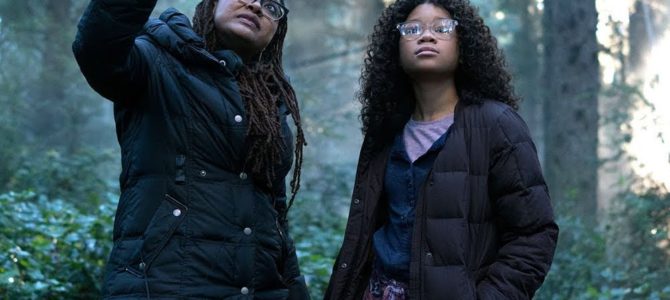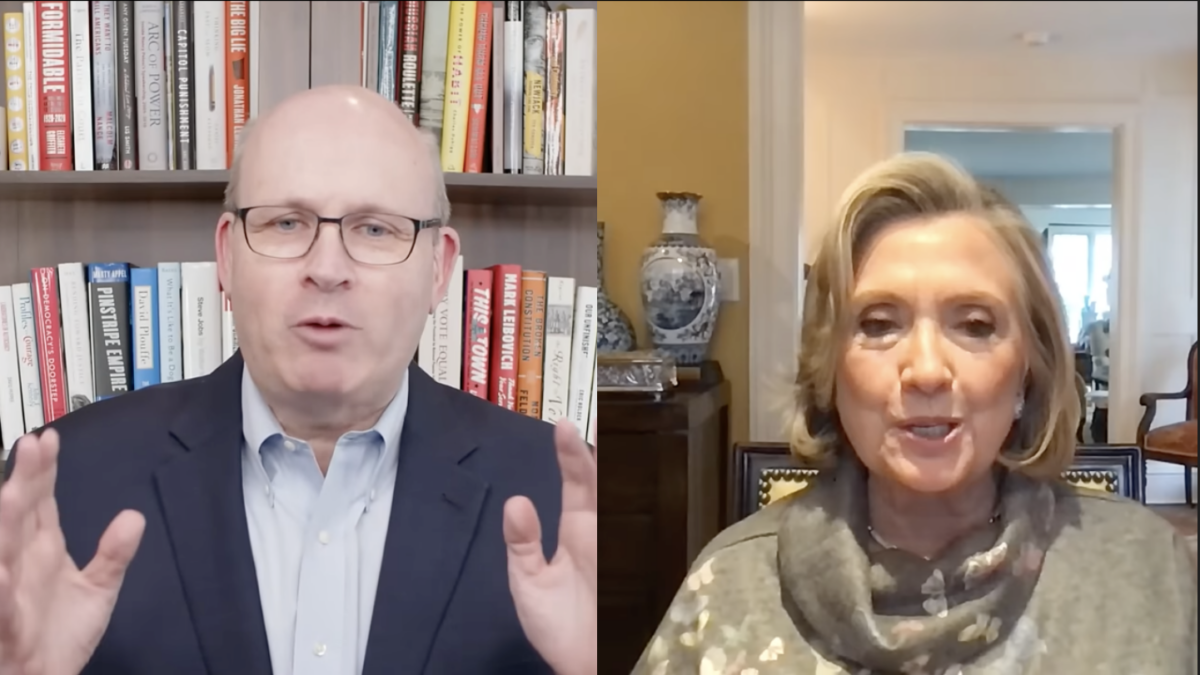
You’ve probably heard about the many changes to the film adaption of Madeleine L’Engle’s “A Wrinkle in Time.” Characters, sequence of events, dialogue, and themes — many have been tweaked, altered, or removed entirely. Some of these I have no problem with, such as changing Meg’s race or even dressing Oprah Winfrey’s Mrs. Which like a parody of Beyoncé.
One theme, however, has been so recklessly and deliberately removed that it drains this already abysmal film of depth and strips it of a universal message we all need to hear. That theme is God’s love.
Does this sound like a minor point? It might appear to be, but we have to go to the book to discover why it isn’t. Consider the advice Mrs. Who, one of the three guardian angels in the book, gives to Meg as she prepares to go back to the terrible planet Camazotz to save her little brother from the clutches of IT.
It’s a quotation from Scripture: “The foolishness of God is wiser than men; and the weakness of God is stronger than men. For ye see your calling, brethren, how that not many wise men after the flesh, not many mighty, not many noble, are called, but God hath chosen the foolish things of the world to confound the wise; and God hath chosen the weak things of the world to confound the things which are mighty. And base things of the world, and things which are despised, hath God chosen, yea, and things which are not, to bring to nought things that are.”
She paused, and then she said, “May the right prevail.”
What is this “weak” thing, this “foolishness of God” that confounds the mighty? In one way, it’s Meg. She’s just a girl, and she’s about to face one of the greatest, most powerful evils in the universe. But there’s more to this “foolishness” than a simple human vessel fighting the principalities of darkness.
“We gave you gifts the last time we took you to Camazotz,” Mrs. Whatsit says. “We will not let you go empty-handed this time. But what we can give you now is nothing you can touch with your hands. I give you my love, Meg. Never forget that. My love always.”
“You have something that IT has not,” Mrs. Which tells her. “This something is your only weapon. But you must find it for yourself.”
This sole weapon, this “right” that will prevail, is nothing less than love, and it’s not just any love. It’s not learning to love yourself, as the movie portrays. It’s not the impersonal love of “the universe.” It’s not humans gathered singing chakra healing chants. It’s God’s fixed and deeply personal love that never fails. It is the one thing evil doesn’t have. It’s the only thing that gives us the strength to overcome spiritual darkness.
Meg discovers this strength as she faces the disembodied brain of IT and her brother who has been subverted by evil. At first she feels hate and rage rise up within her — feelings that come so naturally to her. This thing before her is vile, wicked, and loathsome to its core. It has stolen Charles Wallace. Its hate is reflected in his eyes — eyes that once looked at her with affection and gentleness.
She wants to rip it apart, but then she remembers Mrs. Which’s words: Her greatest weapon would be something IT doesn’t have. IT has plenty of hate, but it doesn’t have the one thing she has in abundance — God’s love for us and our love for others.
“Mrs. Whatsit hates you,” Charles Wallace seethes, attacking Meg with more hate. This is what evil does. It wants to weaken us by causing us to doubt God’s love for us, and Mrs. Whatsit’s love is God’s love. As a guardian angel, she is a messenger of God and speaks for him, having no divine authority or power herself.
Telling Meg that Mrs. Whatsit hates her is IT’s “fatal mistake.”
“‘Mrs Whatsit loves me,’ Meg said to herself. ‘That’s what she told me, that she loves me,’ suddenly she knew. She knew! Love. That was what she had that IT did not have.”
As Mrs. Whatsit told Charles Wallace earlier in the book, “Light shineth in darkness; and the darkness comprehended it not.” That light is truth, but it is also love — a love not wrought by human experience or born of human emotion, but existing for eternity in the God of love.
This love is a central theme throughout L’Engle’s “A Wrinkle in Time.” It binds the Murray family together. It attracts Calvin to their intimate fold. It drives Meg to look for her father. It saves Meg from the “spiritual damage” she suffered when she passed through the Black Thing, as Aunt Beast heals her with love. It also, finally, saves Charles Wallace.
As Meg clings to the love of Mrs. Whatsit, she finds the power and strength to love her brother, even though in that moment he isn’t worthy of love. “I love you, Charles Wallace,” she cries. “ You are my darling and my dear and the light of my life and the treasure of my heart. I love you. I love you. I love you.”
In facing spiritual struggles, sin, temptation, and the darkness of this fallen and corrupt world, our greatest weapon is not a love built on human subjectivity, which shifts and changes like the wind. The love we need, the love that sustains, comes from an objective, fixed source — our Creator. Otherwise, we are relying on our own strength, and we will fail. We will fail to win the spiritual battles that plague us, and we will fail to love others even as God has loved us.
Sadly, the film fails to communicate this great truth. Instead, it focuses on the self as the source of our strength, abandoning L’Engle’s profound message of God’s power and love. In this, it has failed to communicate a universal truth that is found in so many works of fantasy and myth. It has failed as art.
L’Engle, in her Newbery Medal acceptance speech, said, stories like “A Wrinkle in Time” have power because they communicate a universal meta-narrative through the imagination — something children absorb so readily even if they don’t realize they’re reading about great universal truths: “What a child doesn’t realize until he is grown is that in responding to fantasy, fairy tale, and myth he is responding to what Erich Fromm calls the one universal language, the one and only language in the world that cuts across all barriers of time, place, race, and culture.”
This language is not man-made. If it were, we would have no way to find objective commonality or shared understanding of it. Universal means there is objective truth. It’s not subjective or particular; the universal language is not an evolutionary string of particulars that can, logically, only culminate in a particular. Universal is true for all, outside of our own development and experiences.
Love — perfect divine love that drives out all fear — is a universal language that should never be ripped from the pages of fantasy and replaced with weak, subjective love. As we portray characters who sacrificially love one another, we must be faithful to communicate that the source of this horizontal love is, first and foremost, vertical love.
Other writers have captured this same universal language, communicating so powerfully the true nature of love and its role in our spiritual battle. J.R.R. Tolkien portrays this in “The Lord of the Rings” when Frodo is corrupted by the ring of power. Like Charles Wallace (and Meg for a short time), he is spiritually damaged by his contact with evil. The intense and painful struggle is not one he can overcome alone. He is saved by the love of Sam, who faithfully follows him to the edges of hell.
This love is strengthened by a gift from the elf queen Galadriel, a phial containing the light of a star that symbolizes angelic origin. Tolkien wrote in his letters that a guardian angel is “not a thing interposed between God and the creature, but God’s very attention itself, personalized. … This is a finite parallel to the Infinite.”
This is similar to how Mrs. Whatsit, who was once an angelic star, infuses Meg with divine light and love to overcome the Black Thing. Frodo carries this power with him into Mordor, and Sam takes it up when Frodo loses it in his battle with the monster Shelob.
This is the universal language of love that God has given us, and we must not lose the personal nature of it. To reduce God to a mere impersonal force of the universe, or to put loving ourselves before God’s love for us, not only weakness the narrative, but cuts the thread of a theme that is woven into the fabric of human experience.
It is also one our children need to learn; it’s a theme humans need to learn in every age, because we so easily forget. Our world is sorely lacking in love, and one reason is we either choose the easy path of hate, intellectualize everything instead of loving, or we love in our own strength, looking to ourselves or others as the source of love. When we do this, we are always disappointed. We fail. We become discouraged, loneliness engulfs us, and our spirits grow heavy with the weight of sin.
To be victorious and fight the Black Thing that threatens each of us and our world, we need to remember that we are loved. “Mrs. Whatsit said to remember that she loves me,” Meg said as she faced her battle with evil. “That’s what I have to think about. Not about being afraid. Or not as smart as IT. Mrs. Whatsit loves me. That’s quite something, to be loved by someone like Mrs. Whatsit.”
Indeed, it is quite something to be loved by someone like God.
“This is how God showed his love among us: He sent his one and only Son into the world that we might live through him. This is love: not that we loved God, but that he loved us and sent his Son as an atoning sacrifice for our sins. Dear friends, since God so loved us, we also ought to love one another” (1 John 4:9-11).








